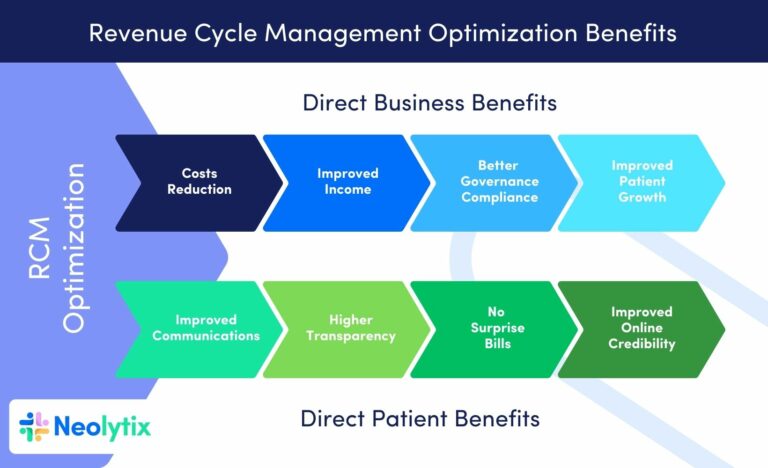I recently had a discussion with a provider (who will remain anonymous for now) at a conference about the benefits of outsourcing revenue cycle management and used a few case examples to illustrate my point. His facial expression changed, and he halted me midway in.
“Are you talking about billing and coding?” He asked.
Surprised, to put it politely, was how I felt about his comment. Even now, as we are going into 2024, there’s still uncertainty about the role of Revenue Cycle Management (RCM) within a healthcare organization, and often, people mistake RCM for billing and coding. That’s why I decided to write this article. To shine more light on RCM and the benefits of outsourcing RCM, regardless of their size.
Table of Contents
What is Revenue Cycle Management?
Revenue cycle management (RCM) is a crucial process for healthcare practices. It involves the tracking and management of patient financial information, from appointment scheduling and registration to insurance verification and billing, all the way through to payment processing and collections.
RCM is not just another term for billing and coding, although billing and coding are essential steps within the revenue cycle. But more about that later.
RCM is essential for healthcare organizations to ensure they are accurately and promptly reimbursed for their services. Revenue cycle management optimization will improve a healthcare organization’s financial health and the overall patient experience, which is pivotal to boosting online reviews, testimonials, and, of course, word of mouth— essential elements that spur growth and future growth prosperity.
The video below showcases the 4 major differences between RCM and Medical Billing.
Why Should Healthcare Organizations Extend Their Focus from Billing to RCM as a Whole?
After watching the video above, you realized that a comprehensive RCM strategy involves managing the entire financial cycle of a healthcare practice.
While billing and coding are essential aspects of the revenue cycle management process, they are just one piece of the puzzle.

According to a recent survey of 141 healthcare executives that included CEOs, CFOs, COOs of larger healthcare organization, 77% saw labor shortage as one of the biggest concerns for 2024.
What does that have to do with RCM?
Well, in the context of RCM, Patient Access plays a vital role as it’s situated at the start of the cycle. When labor shortages become problematic, healthcare organizations can outsource patient access to vendors to prevent a negative effect on the patient experience.
In addition, Robotic Process Automation (RPA) can replace rule-based, repetitive processes to reduce errors and the need for additional human resources to manage these tasks.
Let’s use another example: 31% of respondents were concerned about payor contract negotiations.
Again, reimbursements are the end-product of the revenue cycle. The fees payors pay for services could be renegotiated to improve reimbursements. However, not all healthcare organizations have the capacity or knowledge to do so. Expert RCM companies have the resources to renegotiate these contracts successfully.
These are just some examples to illustrate the role of RCM in addressing macroeconomic and microeconomic challenges. Overall, by focusing on the entire revenue cycle, healthcare practices can realize the following benefits:
- Improving cash flow
Effective RCM can help a practice to improve its cash flow by reducing the time it takes to receive payment for services rendered. By streamlining the medical billing process and collections process, practices can ensure they are paid promptly and avoid cash flow issues.
- Reducing Denials and Rejections
By managing the entire revenue cycle, practices can reduce the number of denied or rejected claims. This can be achieved by ensuring that claims are submitted accurately and on time and that errors or issues are addressed promptly.
- Increasing Revenue
By optimizing the revenue cycle, practices can increase their revenue and profitability. This can be achieved by identifying areas where revenue is lost or not captured and implementing strategies to address these issues.
- Enhancing Patient Satisfaction
A well-managed revenue cycle can also lead to higher patient satisfaction. By streamlining the billing and collections process and providing clear and accurate information about insurance coverage and costs, practices can improve the patient experience.
- Meeting Regulatory Requirements
Healthcare organizations must comply with various regulatory requirements, including HIPAA, No Surprises Act, etc. By prioritizing RCM, procedures can ensure they meet these requirements and avoid costly penalties and fines.
A comprehensive RCM strategy can help practices achieve these goals and long-term financial stability.
Can Revenue Increase Through Revenue Cycle Management Optimization?
A while back, I delved into the projections of RCM and discovered research that projected that the global healthcare RCM outsourcing market would grow at a compound annual growth rate (CAGR) of 9% between 2022 and 2030.
The report cited the cost savings and operational efficiency benefits of outsourcing RCM as critical factors driving this growth.
Now, at the end at the end of 2023, the numbers are looking even more favorable. Research predictions for 2023–2030, according to Databridge, suggest that growth will continue at a CAGR of 15.2%.
These data points speak for themselves. The value of RCM and especially the outsourcing of the function to experts in the field are becoming clearer. One of the value drivers of RCM is the increase in reimbursement revenue.
Healthcare organizations can reduce claim denials, improve collections, and accelerate the revenue cycle by improving key RCM processes such as patient registration, eligibility verification, charge capture, coding, and billing.
The percentage of revenue increase with proper Revenue Cycle Management service improvements can vary depending on the following:
- Healthcare Organization (HO) current state of RCM
- HO size
- Specialty of HO
- Level of RCM optimization
- Level of expertise of the outsourced RCM vendor
However, in our experience, on average, healthcare organizations implementing effective RCM practices and technologies can achieve a 5% to 10% revenue increase.


Healthcare organizations can reduce claim denials, improve collections, and accelerate the revenue cycle by improving key RCM processes such as patient registration, eligibility verification, charge capture, coding, and billing.
It’s worth noting that the exact percentage of revenue increase may vary based on various factors and individual situations and that revenue growth is not guaranteed by implementing RCM solutions. However, proper RCM can help healthcare organizations improve their financial performance and achieve sustainable development over time.
Can RCM Reduce Operational Costs?
RCM holds the potential to significantly reduce operational costs for healthcare organizations. The bottom-line benefits from streamlined processes and increased efficiency achieved through advancing technology in RCM solutions. These technologies (such as RPA) automate time-consuming tasks, such as billing and claim processing, leading to faster turnaround times and minimizing manual errors.
One critical aspect contributing to cost reduction is denial management. RCM systems equipped with advanced analytics can identify trends and root causes of claim denials. By addressing these issues proactively, healthcare providers can mitigate denials, optimize revenue streams, and avoid the costly process of reworking denied claims.
Moreover, outsourcing RCM to specialized companies brings about cost savings. Outsourcing allows healthcare organizations to leverage the expertise and resources of external providers, reducing the burden on in-house staff and avoiding the need for extensive training and infrastructure investments.
This strategic approach to RCM not only enhances operational efficiency but also provides a cost-effective solution for navigating the complexities of revenue management in the healthcare industry.
The percentage of operational cost reduction when outsourcing Revenue Cycle Management (RCM) can vary depending on several factors (similar to what we mentioned in the previous section. In case you skipped the previous section, here they are again:
- Healthcare Organization (HO) current state of RCM
- HO size
- Specialty of HO
- Level of RCM optimization
- Level of expertise of the outsourced RCM vendor


Over time, healthcare organizations can see a gradual cost reduction happening and we’ve experience cost savings from 15% upward.
Of course macro variables can still have a massive impact that could reduce the effect of RCM optimization, like a spike in inflation for instance. But then one also needs to ask the question: Where would this healthcare organization be if they did not have all the processes optimized during the time of impact?
What’s the Cost of Outsourcing Revenue Cycle Management?
The cost of outsourcing revenue cycle management services can vary widely depending on the specific needs and services required and the RCM vendor chosen. RCM vendors can charge a percentage of the amount collected or a flat fee per claim or service. The exact percentage or fee structure can depend on the following:
- the specific vendor,
- the size of the healthcare organization
- the types of services required
- Specific agreement between vendor and provider
If you are looking for a team of experts to reduce insurance claims denials and underpayments, engage in proper billing practices, improve your practice’s patient experience, and more, Neolytix has the answer. With over 11 years of experience in the field, has the expertise to enhance your future financial prosperity.
If you wish to learn more about the costs and benefits associated with outsourcing revenue cycle management, schedule a free demo today.
Schedule a Free Consultation to learn more about optimizing your revenue cycle
Complete the form and someone from our team will be in touch with you!











